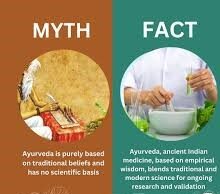There’s a common misconception that Ayurveda is purely spiritual or faith-based. While it does have spiritual roots, Ayurveda is a scientific system of medicine that combines empirical knowledge, personalized treatments, and natural remedies to maintain health and wellness. In this post, we will debunk this myth and explain how Ayurveda is rooted in science and practical treatments.
What Is Ayurveda?
Ayurveda, which means “the science of life,” is a system of healing that originated in India over 3,000 years ago. It is based on the balance of the three doshas—Vata, Pitta, and Kapha—which regulate bodily functions and health. Unlike many spiritual practices, Ayurveda emphasizes scientific diagnosis and holistic treatments such as herbal remedies, diet, and lifestyle adjustments.
Is Ayurveda Purely Faith-Based?
The myth that Ayurveda is purely faith-based stems from its philosophical and spiritual origins. While it recognizes the mind-body connection, Ayurveda is grounded in practical and scientific principles. Here’s why:
- Empirical Diagnosis: Ayurveda utilizes diagnostic methods like pulse reading and tongue analysis, based on real-world observations, not just spiritual practices.
- Herbal Remedies: Ayurvedic herbs like Ashwagandha and Triphala have been scientifically proven for their therapeutic benefits.
- Personalized Treatments: Ayurveda tailors diets and treatments according to an individual’s dosha type, ensuring practical and scientifically supported health solutions.
How Does Ayurveda Differ from Spiritual Healing?
| Aspect | Ayurveda | Spiritual Healing |
|---|---|---|
| Foundation | Rooted in dosha balance and science | Based on spiritual energy or beliefs |
| Methods | Herbs, diet, detox, therapies | Meditation, prayer, and rituals |
| Focus | Physical, mental, and emotional health | Primarily emotional or spiritual health |
Scientific Backing for Ayurvedic Practices
Recent studies have shown that Ayurvedic remedies are more than just spiritual beliefs:
- Ashwagandha: Studies show it helps reduce stress, lower cortisol levels, and improve mental clarity.
- Turmeric: Known for its anti-inflammatory properties, it is scientifically proven to support overall health.
- Panchakarma: A detoxification process that has shown measurable health benefits, such as improving digestion and enhancing immune function.

Conclusion: Ayurveda Is a Holistic Science
The misconception that Ayurveda is purely spiritual or faith-based overlooks its scientific and empirical foundations. It is a comprehensive system that integrates natural remedies, scientific diagnosis, and lifestyle recommendations to promote physical, mental, and emotional well-being. While faith can enhance the healing process, Ayurveda’s effectiveness is grounded in empirical knowledge.
For more details, visit the National Center for Complementary and Integrative Health and WHO Guidelines on Traditional Medicine.
